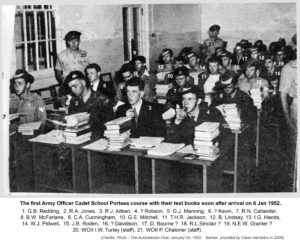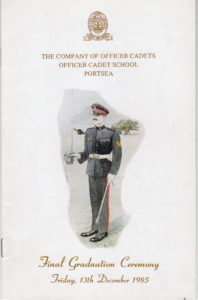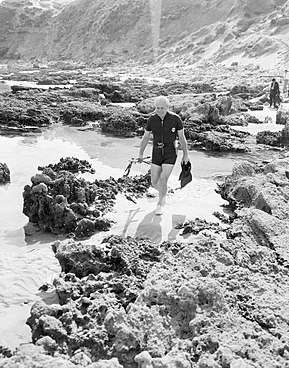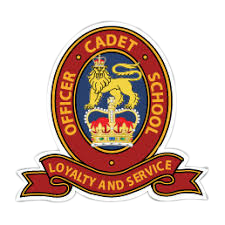
As an officer training institution, the Officer Cadet School at Portsea established its reputation, not only nationally but also regionally in international military circles. The method used was to train cadets as rifle platoon commanders, the junior infantry officer appointment in the army. This training provided the basis for future career development for all Australian Army officers. Cadets graduated with the rank of Second Lieutenant except when graduates holding tertiary qualifications were commissioned as Lieutenants.
OCS Portsea received its first intake of cadets in January 1952. It continued to operate as an officer training establishment until December 1985 when its role was transferred to the Royal Military College [RMC] at Duntroon in the ACT.
The first six OCS courses were 22 weeks in duration but thereafter courses were increased to 44 weeks, except for the final Junior Class which started training here in June 1985. After completing 22 weeks at Portsea, this Class was transferred to RMC and undertook another year of training before graduating in December 1986. Fourteen women cadets, including two from Brunei, were commissioned in the OCS’s final Graduating Class in December 1985.
3544 Officer Cadets graduated from OCS which includes 68 Officer Graduates from the Officer Training Unit [OTU] Scheyville’s OCS Wing. The OTU had been set up to train National Service officers for the Second National Training Scheme introduced by the Australian Government in 1964.
In all, Australian Regular Army OCS officer graduates totalled 2826, as well as 30 Royal Australian Air Force (RAAF) officers who initially undertook ground defence roles with some branching out into other musterings. OCS also trained 688 international students from 14 countries, the first arriving from New Zealand and Malaya in 1957. International graduation numbers were: New Zealand [398], Malaya/Malaysia [91], Papua New Guinea [61], Singapore [40], The Philippines [38], Fiji [24], Brunei [16], South Vietnam [6], Nigeria [4], Cambodia and Kenya [3 each], Tonga [2], Thailand and Uganda [1 each].
On graduation, officers were allocated to the full range of army Corps where specialist training was undertaken.
OCS Portsea graduates have served around the world on active service in conflicts such as the Malayan Emergency, Malaysian Border Operations, Malaysian Confrontation, Vietnam, Philippines Counter-Insurgency, Iraq, Afghanistan, East Timor together with a wide range of United Nations Peacekeeping operations.
Major Peter Badcoe, who graduated from OCS in December 1952, was awarded a posthumous Victoria Cross for bravery in South Vietnam in April 1967. Many other graduates also won gallantry awards on the battlefield as well as honours for exemplary service. Twenty-two graduates died on active service.
Three OCS graduates attained the highest level in the Australian Army as Chief of Army, with many other Australian graduates achieving high rank in both the Army and the RAAF. Several overseas graduates also achieved high rank in their respective defence forces.

Prime Minister Harold Holt’s Disappearance
 Prime Minister Harold Holt and his wife Zara owned a beach house at Portsea. Both the PM and his wife occasionally visited the OCS Officers’ Mess. On 17 December 1967 at approximately 12.15 PM the PM and his party went to Cheviot Beach, a favourite swimming spot of his. Cheviot Beach was a rugged area on the back beach or seaward side of Point Nepean. Apart from PM Holt only one other of his party entered the water but, because of rough seas, stayed close to the shore. The PM ventured further out. The other swimmer reported a strong undertow. Others in the party saw the PM being swept out further and further before finally disappearing from sight.
Prime Minister Harold Holt and his wife Zara owned a beach house at Portsea. Both the PM and his wife occasionally visited the OCS Officers’ Mess. On 17 December 1967 at approximately 12.15 PM the PM and his party went to Cheviot Beach, a favourite swimming spot of his. Cheviot Beach was a rugged area on the back beach or seaward side of Point Nepean. Apart from PM Holt only one other of his party entered the water but, because of rough seas, stayed close to the shore. The PM ventured further out. The other swimmer reported a strong undertow. Others in the party saw the PM being swept out further and further before finally disappearing from sight.
The alarm was raised at the OCS Duty Room manned at the time by Captain Peter Schuman, MC. Peter was an OCS Graduate who had returned as an instructor. Limited manpower resources, however, were not available for an immediate OCS personnel search as it was just after the 1967 December Graduation and most staff were on leave. The OCS Headquarters was used as the operations centre in the massive search that followed but it was eventually called off on 5 January 1968. The PM’s body was never recovered.
